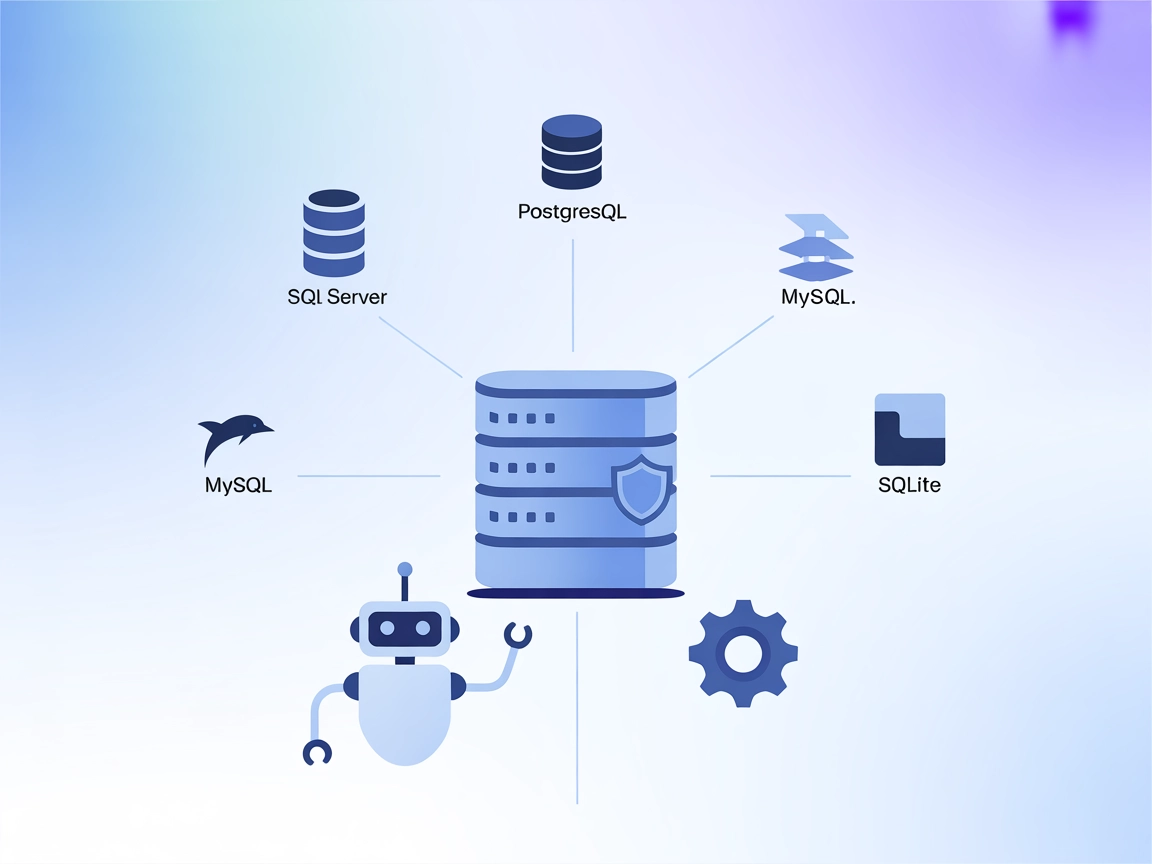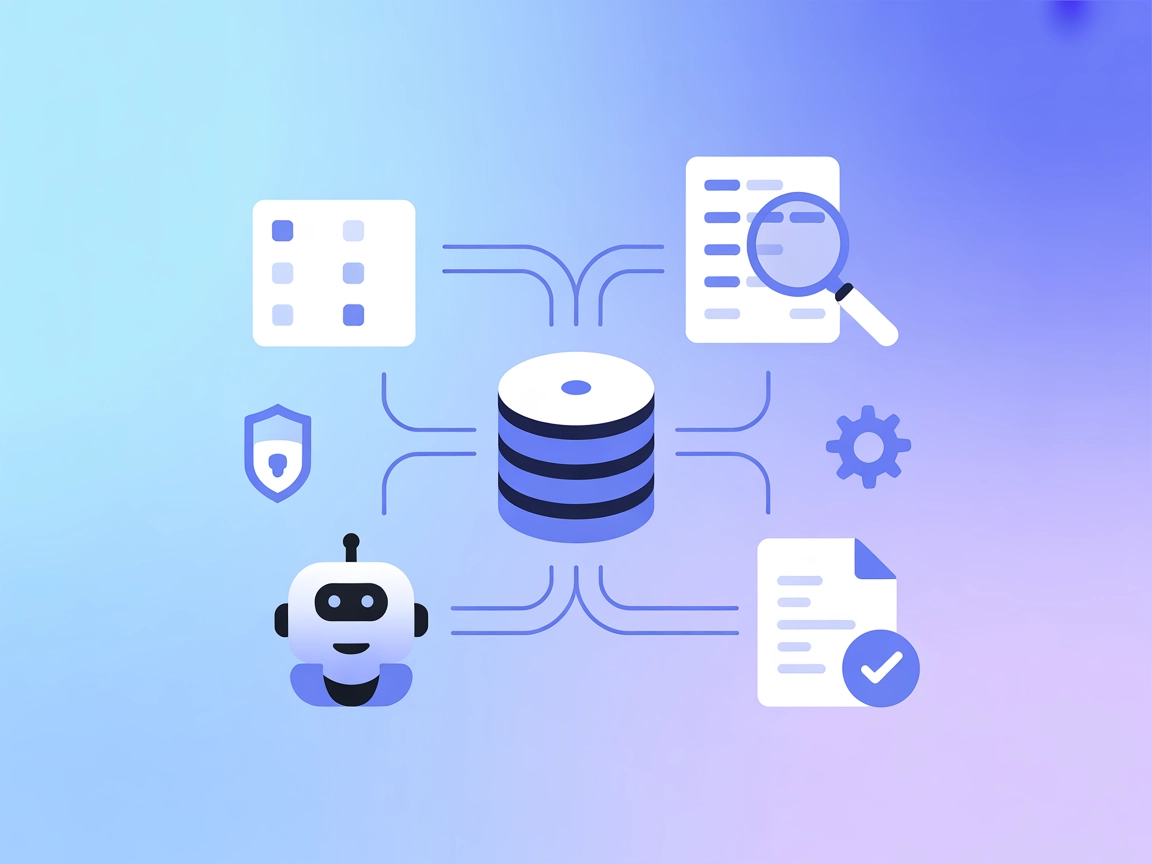
JDBC MCP Server
The JDBC MCP Server enables seamless integration between AI assistants and relational databases using the JDBC standard. It allows AI agents to execute database...

Connect your AI agents to SQL databases with FlowHunt’s JDBC MCP Server for seamless, automated data access, analytics, and management.
FlowHunt provides an additional security layer between your internal systems and AI tools, giving you granular control over which tools are accessible from your MCP servers. MCP servers hosted in our infrastructure can be seamlessly integrated with FlowHunt's chatbot as well as popular AI platforms like ChatGPT, Claude, and various AI editors.
The JDBC MCP (Model Context Protocol) Server is designed to connect AI assistants with SQL databases using the JDBC interface. By acting as a bridge between AI clients and relational databases, it enables large language models and AI agents to perform real-time queries, retrieve data, and interact with structured data sources. This integration enhances development workflows by allowing AI-driven tools to execute database operations such as reading, writing, and managing data without manual intervention. The JDBC MCP Server streamlines tasks like business analytics, data exploration, and report generation by providing standardized, secure, and programmatic access to database resources.
No prompt templates were found in the provided repository section.
No explicit resources were described in the provided repository section.
functions namespace. This tool acts as a wrapper, ensuring tools can operate simultaneously if their parameters are compatible.No further individual tools were listed; only the multi-tool use wrapper is defined.
windsurf.config.json).{
"mcpServers": {
"jdbc-mcp": {
"command": "npx",
"args": ["@jdbc/mcp-server@latest"]
}
}
}
To secure credentials (e.g., database URLs or API keys), use environment variables:
{
"mcpServers": {
"jdbc-mcp": {
"command": "npx",
"args": ["@jdbc/mcp-server@latest"],
"env": {
"JDBC_DATABASE_URL": "${JDBC_DATABASE_URL}"
},
"inputs": {
"dbUser": "${DB_USER}",
"dbPassword": "${DB_PASSWORD}"
}
}
}
}
{
"mcpServers": {
"jdbc-mcp": {
"command": "npx",
"args": ["@jdbc/mcp-server@latest"]
}
}
}
.cursor/config.json file.{
"mcpServers": {
"jdbc-mcp": {
"command": "npx",
"args": ["@jdbc/mcp-server@latest"]
}
}
}
cline.config.json file.mcpServers:{
"mcpServers": {
"jdbc-mcp": {
"command": "npx",
"args": ["@jdbc/mcp-server@latest"]
}
}
}
Using MCP in FlowHunt
To integrate MCP servers into your FlowHunt workflow, start by adding the MCP component to your flow and connecting it to your AI agent:

Click on the MCP component to open the configuration panel. In the system MCP configuration section, insert your MCP server details using this JSON format:
{
"jdbc-mcp": {
"transport": "streamable_http",
"url": "https://yourmcpserver.example/pathtothemcp/url"
}
}
Once configured, the AI agent is now able to use this MCP as a tool with access to all its functions and capabilities. Remember to change “jdbc-mcp” to whatever the actual name of your MCP server is and replace the URL with your own MCP server URL.
| Section | Availability | Details/Notes |
|---|---|---|
| Overview | ✅ | |
| List of Prompts | ⛔ | Not present in repo section |
| List of Resources | ⛔ | Not present in repo section |
| List of Tools | ✅ | Only multi_tool_use.parallel tool |
| Securing API Keys | ✅ | Provided generic example |
| Sampling Support (less important in evaluation) | ⛔ | Not specified |
Roots Support: Not mentioned.
Based on the available information, the JDBC MCP Server provides core multi-tool orchestration functionality, but lacks explicit prompt templates and resource definitions. It provides standard setup instructions and secure key handling, but does not document advanced MCP concepts like roots or sampling.
Given the lack of prompt templates, resource definitions, and advanced features (roots, sampling) in the public section, this MCP server is functional for basic tool orchestration with database focus, but would benefit from more documentation and feature exposition. Overall, it scores a 5/10 for basic functionality and setup clarity, but lacks depth in exposed MCP primitives.
| Has a LICENSE | ⛔ (not found in provided section) |
|---|---|
| Has at least one tool | ✅ |
| Number of Forks | N/A |
| Number of Stars | N/A |
The JDBC MCP Server enables AI assistants and agents to connect to SQL databases using the JDBC protocol. It acts as a middleware layer so AI-driven tools can perform real-time data queries, analytics, and management tasks securely and programmatically.
It supports database management (CRUD operations), business analytics automation, interactive data exploration for data scientists, automated application testing, and backend API integrations with SQL databases.
Use environment variables in your MCP server configuration to securely store sensitive details like database URLs, usernames, and passwords, avoiding hardcoding secrets in your config files.
No, the provided JDBC MCP Server setup focuses on core tool orchestration and database connectivity, without explicit prompt templates or resource definitions.
The main tool included is a parallel multi-tool wrapper, enabling simultaneous execution of multiple compatible tools from the functions namespace.
It provides a functional and clear setup for basic AI-to-database workflows, but lacks advanced documentation, prompt templates, and deeper MCP feature exposure. Overall, it scores 5/10 for basic functionality and integration clarity.
Empower your AI agents to access and manage SQL databases in real time. Get started with JDBC MCP Server setup in FlowHunt today.

The JDBC MCP Server enables seamless integration between AI assistants and relational databases using the JDBC standard. It allows AI agents to execute database...

The MCP Database Server enables secure, programmatic access to popular databases like SQLite, SQL Server, PostgreSQL, and MySQL for AI assistants and automation...

The MySQL MCP Server provides a secure bridge between AI assistants and MySQL databases. It enables structured database exploration, querying, and data analysis...
Cookie Consent
We use cookies to enhance your browsing experience and analyze our traffic. See our privacy policy.